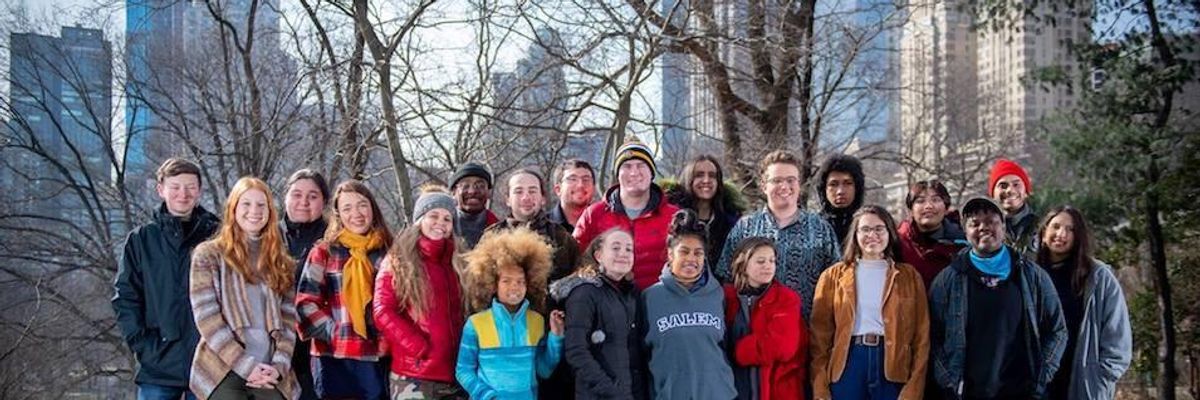In a ruling taken as a devastating blow for climate campaigners worldwide, the 9th Circuit Court of Appeals in the United States on Friday afternoon threw out a lawsuit brought by 21 youth plaintiffs who accused the U.S. government of failing its constitutional mandate by refusing to act urgently and responsibly to address the existential threat of human-caused global warming.
"This is far from over." --Julia Olson, Our Children's TrustThe case at issue, Juliana vs. United States, has been seen as a potential landmark case not just domestically but across the globe and while the three-member panel of the 9th Circuit--notably seen as one of the country's most liberal-minded circuit courts--agreed with the plaintiff's argument that the U.S. government has operated as a barrier to climate action it concluded the courts were not the appropriate avenue for their complaint.
In the 2-1 majority ruling, written by Circuit Court Judge Andrew Hurwitz, he stated that while the panel was convinced by the narrative set forth in the lawsuit--agreeing the climate crisis has brought the world close to the "eve of destruction" and that "the government's contribution to climate change is not simply a result of inaction"--it ultimately and "reluctantly concluded that the plaintiffs' case must be made to the political branches or to the electorate at large."
Andrea Rodgers, a senior attorney at Our Children's Trust, the nonprofit backing the youth who filed the lawsuit, described the decision as an "unprecedented and contrary to American principles of justice."
The Juliana case began in 2015, when a group of young people--aged 11 to 22-years-old at the time--sued the U.S. government for violating their constitutional rights to life, liberty, and property by enacting policies that contributed to the climate crisis.
Kelsey Juliana , the 23-year-old named as lead plaintiff in the sase, said Friday: " This isn't over. Prepare for a petition for review en banc to the 9th Circuit as we refuse to do anything butmove forward and ultimately win. Courts do have an obligation to address issues of constitutional, existential crisis, like climate change." Juliana asked supporters and allies, to "stay hopeful, stay with us, stay tuned," and "stay in power."
While Our Children's Trust vowed to appeal, members of the broader climate justice movement decried the ruling as a grave injustice.
Alexandria Villasenor, not a party to the suit but a leading youth climate activist in the U.S., tweeted:
"What is remarkable about this decision, and what will land it in legal textbooks for decades to come, is that the 9th Circuit recognizes the grave realities of the climate crisis and the government's role in causing climate harms, but immediately abdicates the court's own responsibility to address and remedy those harms," said Carroll Muffett, president of the Center for International Environmental Law (CIEL), in response.
Muffet said the panel's conclusion that the courts have no role to play in addressing the legitimate grievance of the plaintiffs flies in the face of the entire purpose of judicial review.
"For centuries, and emphatically," Muffett said, "that has been the definition of the role of courts: when plaintiffs are suffering harms to fundamental rights at the hands of other branches of government, addressing those wrongs and protecting plaintiffs' rights is the essential and inescapable domain of the federal courts."
"Whether on issues of equality between genders or equality between races," she added, "courts have a long history of doing precisely what the panel says they cannot do here."
Ken Kimmell, president of the Union of Concerned Scientists, said the decision only "underscores the climate policy paralysis" that exists in the nation's governing bodies--from the courts to the White House to Congress and back again.
"In a functional democracy, communities facing catastrophic flooding, heat waves and other climate impacts would be able to press elected officials to comprehensively and effectively cut the emissions of heat-trapping gases and reduce the massive harm that we are experiencing now and will experience in the future," Kimmell said.
Citing the "blistering" dissenting opinion of District Court Judge Josephine Staton, Kimmell warned that "we live in a time where the government has failed to act--in large part due to fossil fuel industry's outsized influence--despite overwhelming scientific evidence that delaying action will only lock in more severe climate impacts."
In her dissent, Staton disagreed strongly with the conclusion of her panel colleagues.
"It is as if an asteroid were barreling toward Earth and the government decided to shut down our only defenses. Seeking to quash this suit, the government bluntly insists that it has the absolute and unreviewable power to destroy the Nation," Staton wrote. "My colleagues throw up their hands, concluding that this case presents nothing fit for the Judiciary."
In a statement (pdf), Julia Olson, another attorney with Our Children's Trust, said, "This is far from over."
Olson said the group would file a request for an "en banc" hearing by the full Ninth Circuit--a step in the appeals process that would allow a larger selection of the Ninth Circuit, as opposed to the initial three-member panel to consider the case.
CIEL's Muffett said she looks forward to that prospect.
"Now, the entire Ninth Circuit will have the opportunity to either correct that error and make a history it can be proud of," Muffett said. "Or replicate it, and spend the decades to come as another grim reminder that courts too often perpetuate injustice rather than confront it."
